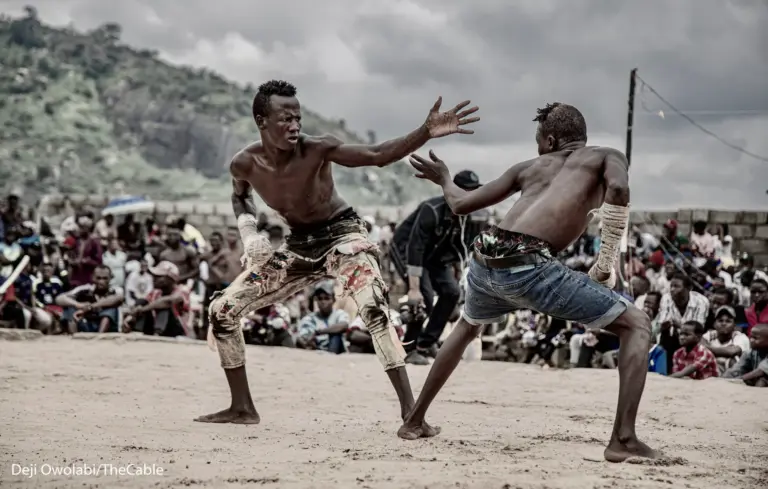With the combined energy of DAZN, Silverbacks, and an expanding fanbase, Dambe—Nigeria’s traditional martial art—is emerging as one of Africa’s most promising cultural exports, poised to carve a niche on the world stage.
“This is a combat sport unlike any other, deeply rooted in African and Nigerian heritage. Every fighter is accompanied by a Mayan, a spiritual guide you won’t find in any other fighting discipline,” explains Maxwell Kalu, CEO of African Warriors Fighting Championship (AWFC).
Centuries ago, in the dry landscapes of northern Nigeria, disputes were settled through a ritualized combat where Hausa warriors wrapped their fists in rope and fought not only for victory but as a sacred rite of passage. This is Dambe—a full-body martial art born from both preparation for battle and a profound cultural tradition.
Today, the sport is experiencing a renaissance led by AWFC, founded in Lagos in 2019, which is positioning Dambe as Africa’s unique contribution to the global combat sports industry.
“We envision Dambe as Africa’s definitive voice in combat sports worldwide,” says Kalu.
With over 900 million views on social media, AWFC has cultivated a robust following. Now, a major milestone awaits: the Dambe World Series will launch on June 28 on DAZN, a premier global sports streaming platform reaching over 200 countries. This debut will introduce millions of viewers to Dambe, starting with an all-Nigerian lineup before opening up to international competitors—an intentional tribute to the sport’s roots.
Understanding Dambe’s heritage is essential. Unlike Western combat sports developed through gyms and sponsorships, Dambe is steeped in tradition among the Hausa people, one of Nigeria’s largest ethnic groups. Fighters traditionally hail from guilds of butchers and fishermen, fighting with one fist wrapped in the kora—a rope known as the spear—while the other hand remains unwrapped as a shield. The objective is symbolic “defeat” by knocking the opponent to the ground.
Integral to the spectacle are live war drums and tribal songs, performed by musicians who serve as historians and poets. “The music isn’t mere atmosphere,” Kalu explains. “It carries deep meaning, signaling the time for battle.”
Each fighter is supported by a Mayan, a spiritual healer who prepares them with herbal remedies that enhance focus, endurance, and bravery—a practice unique to Dambe.
While AWFC has modernized the sport into three rounds of three minutes each, mirroring MMA formats, it preserves these cultural elements: live music, spiritual rites, and a fierce respect for tradition.
Charles Solomon, director of the documentary Dan Bature Kudawa—which follows the sport’s first white fighter, Luke Leyland—describes Dambe as “the very essence of these fighters’ lives, demanding total commitment.”
Leyland recalls his own debut fight as a pivotal moment: “Thousands wagered on the bout, over a million watched on TV. It was historic and set Dambe on a new path.”
Dambe’s raw, unfiltered energy is gaining traction amid global appetite for authentic combat sports. UFC reports that MMA content now reaches nearly 900 million households worldwide annually.
Backing this growth is Silverbacks Holdings, a Mauritius-based investor known for supporting African fintech giants. Ibrahim Sagna, Silverbacks’ Executive Chairman, calls Dambe “a universal sport that captivates audiences with its unscripted intensity and warrior ethos.”
DAZN’s partnership, bringing the sport to a worldwide audience, adds prestige alongside AWFC’s boardroom strength, bolstered by entertainment veteran Sanford Climan.
Challenges remain, from limited infrastructure—local arenas often consist of simple sand pits—to uneven consumer spending power across African markets. Yet, the momentum is clear.
“For Africa, Dambe is more than a sport,” Sagna emphasizes. “It represents a cultural force capable of placing the continent at the heart of the global combat sports conversation.”

